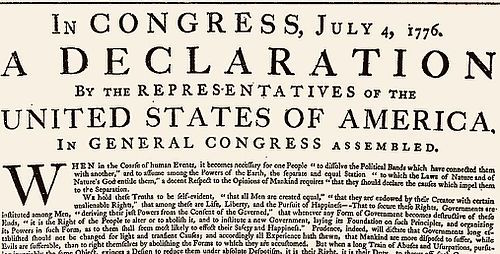Liberals rely on punctuation to subvert the Declaration of Independence
This is one of the silliest articles I have read in a long time. Who published it? The uber-left New York Times, naturally. The Times is promoting a theory by a liberal Princeton professor that the long-standard text of the Declaration of Independence includes an extra period, and that this means–somehow–that we have never understood the document correctly. What’s the difference? The “real” Declaration, without the period, is pro-government! You can’t make this stuff up.
A scholar is now saying that the official transcript of the document produced by the National Archives and Records Administration contains a significant error — smack in the middle of the sentence beginning “We hold these truths to be self-evident,” no less.
The error, according to Danielle Allen, a professor at the Institute for Advanced Study in Princeton, N.J., concerns a period that appears right after the phrase “life, liberty and the pursuit of happiness” in the transcript, but almost certainly not, she maintains, on the badly faded parchment original.
That errant spot of ink, she believes, makes a difference, contributing to what she calls a “routine but serious misunderstanding” of the document. …
[A]s intended by Thomas Jefferson, she argues, what comes next is just as important: the essential role of governments — “instituted among men, deriving their just powers from the consent of the governed” — in securing those rights.
“The logic of the sentence moves from the value of individual rights to the importance of government as a tool for protecting those rights,” Ms. Allen said. “You lose that connection when the period gets added.”
Because Jefferson was such an advocate for expansive government power! Right.
The whole argument is remarkably silly. This is what the Declaration of Independence looks like:

And this is how the relevant text is rendered by the National Archives:
We hold these truths to be self-evident, that all men are created equal, that they are endowed by their Creator with certain unalienable Rights, that among these are Life, Liberty and the pursuit of Happiness.–That to secure these rights, Governments are instituted among Men, deriving their just powers from the consent of the governed, –That whenever any Form of Government becomes destructive of these ends, it is the Right of the People to alter or to abolish it, and to institute new Government, laying its foundation on such principles and organizing its powers in such form, as to them shall seem most likely to effect their Safety and Happiness.
So there is the offending period, after “Happiness.” But what if you remove the period? What if you just have the dash? How is the meaning different? It isn’t different at all: Jefferson wrote that a series of truths are self-evident, and he ticked them off. One of the self-evident truths is that governments are created to secure God-given rights, and that government derives its just powers from the consent of the governed. Period or no period, that is what it says.
And, in case you haven’t kept up with modern liberalism as espoused by the New York Times and Princeton (almost monolithically), Jefferson’s words are as fatal to liberalism as garlic to a vampire. The task of government is to secure the rights that the people already possess, having been given them by their Creator? Natural rights? The horror!
Liberals can’t live with the actual text, or the animating spirit, of the Declaration of Independence. But it will take a heck of a lot more than disputing the placement of a period for them to undermine the timeless truths of the Declaration.